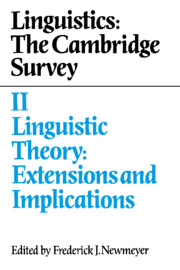Book contents
- Frontmatter
- Contents
- Contributors
- Preface
- 1 Extensions and implications of linguistic theory: an overview
- 2 Grammar and language processing
- 3 Grammatical principles of first language acquisition: theory and evidence
- 4 Second language acquisition and grammatical theory
- 5 Brain structures and linguistic capacity
- 6 Abnormal language acquisition and the modularity of language
- 7 Grammatical aspects of speech errors
- 8 Grammar and conversational principles
- 9 Discourse analysis: a part of the study of linguistic competence
- 10 Speech act distinctions in grammar
- 11 Computer applications of linguistic theory
- 12 Metrics and phonological theory
- 13 Grammatical theory and signed languages
- 14 The linguistic status of creole languages: two perspectives
- 14.I Creole languages and the bioprogram
- 14.II Are creoles a special type of language?
- 14.III A dialog concerning the linguistic status of creole languages
- Subject index
- Name index
- Contents of volumes I, III, and IV
14.III - A dialog concerning the linguistic status of creole languages
Published online by Cambridge University Press: 08 February 2010
- Frontmatter
- Contents
- Contributors
- Preface
- 1 Extensions and implications of linguistic theory: an overview
- 2 Grammar and language processing
- 3 Grammatical principles of first language acquisition: theory and evidence
- 4 Second language acquisition and grammatical theory
- 5 Brain structures and linguistic capacity
- 6 Abnormal language acquisition and the modularity of language
- 7 Grammatical aspects of speech errors
- 8 Grammar and conversational principles
- 9 Discourse analysis: a part of the study of linguistic competence
- 10 Speech act distinctions in grammar
- 11 Computer applications of linguistic theory
- 12 Metrics and phonological theory
- 13 Grammatical theory and signed languages
- 14 The linguistic status of creole languages: two perspectives
- 14.I Creole languages and the bioprogram
- 14.II Are creoles a special type of language?
- 14.III A dialog concerning the linguistic status of creole languages
- Subject index
- Name index
- Contents of volumes I, III, and IV
Summary
In Pieter Muysken's stimulating, informative, and comprehensive overview of Creole theories there are unfortunately one or two misinterpretations of my position. While I have claimed that Creoles are more alike than other languages, and have suggested that they may be in some sense more natural than other languages, I don't think I have ever explicitly stated that they are more simple: the whole concept of simplicity in language is strewn with epistemological and other landmines, and should perhaps be avoided altogether.
Again, on a minor point of detail, it is not the case that ‘around them, [first-generation creole children] only heard pidgin spoken.’ Obviously, they also heard an indefinite number of ancestral languages; these, however, they ignored, precisely because the elaboration of the pidgin represented, to them, far less of a task than the learning of an ancestral language and the subsequent transfer of features from that language to the nascent creole. The nature of the bioprogram rendered input from other languages quite unnecessary for them.
In light of the approach sketched in the present chapter, two of Muysken's ‘core notions’, parameter theory and morphology–syntax interactions, simply fall together: parametric variation is relegated to the lexicon and the interaction between a variable morphology and invariant principles of syntax is what in fact produces the so-called ‘parametric differences’ among languages.
- Type
- Chapter
- Information
- Linguistics: The Cambridge Survey , pp. 302 - 306Publisher: Cambridge University PressPrint publication year: 1988
- 1
- Cited by



